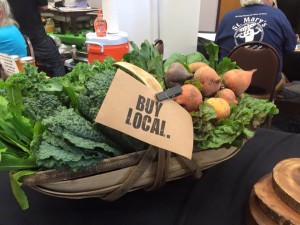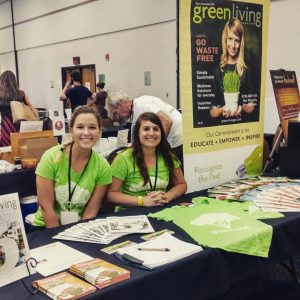By Stephanie Funk
“It’s a butterscotch melon,” Tia Kalla, the Farmers Market Manager for Crooked Sky Farms, told me when I asked about the tiny melon in her impressive and gorgeous spread of produce.
“Would you like to try it?” Seemingly from nowhere, Tia procured a small cutting board and a knife and proceeded to cut both of us a slice. Something like a cantaloupe 2.0, the melon was buttery smooth, and, true to its candy-inspired name, incredibly sweet. Suddenly, I had an end-of-summer treat and a new friend.
Nothing brings people together like food does. When there is an opportunity for food, especially local and sustainable food in the Arizona communities, Green Living heeds the call. Naturally, last Wednesday, we made the trip from our office in North Scottsdale to Tucson for this year’s Farmer+Chef Connection, hosted by our partner Local First AZ. Each year, the Farmer+Chef Connection connects local wholesale food buyers (restaurants, hotels, grocers, etc.) with local growers.
The Tucson Convention Center was filled with rows of tables with colorful (and delicious) displays of fresh produce, baked goods, spices, and spirits. From noon into the early evening, people milled through the rows, sampling each other’s wares and exchanging business cards.
The convention also featured several educational breakout sessions with panels of local experts. We at Green Living
tried to stay present at our table in the “Supplier’s Marketplace,” but we did attend one such breakout session about food waste. The session began with startling statistics: 40% of all food produced goes uneaten (97% of which ends up in landfills) yet 1 in 5 people are food insecure. Panelist Stephanie Vasquez of Fair Trade Café in Phoenix spoke to how her restaurant is reducing its food waste by composting with Recycled City – a seamless “one day to next” transition. Panelist Taylor Sanders of University of Arizona’s Compost Cats
spoke about composting from servicer’s perspective. Compost Cats started as a local pickup service and is now a permanent service sponsored by the City of Tucson. Sanders recommended Biocycle’s website FindAComposter.com to help connect residents and business owners with compost pickup services. Panelist Barbara Eiswerth spoke to how her organization, Iskashitaa Refugee Network, redistributes locally grown foods that would otherwise go to waste, including backyard trees and shrubs, to refugees and other food insecure groups in Tucson.
Nothing brings people together like food does, but how connected are we to the people who produce and supply that food? Events like Farmer+Chef Connection help to foster real, face-to-face food relationships and prompt us to better care for the earth that grows our food.
“Buy Local” photo by Farmer+Chef Connection







